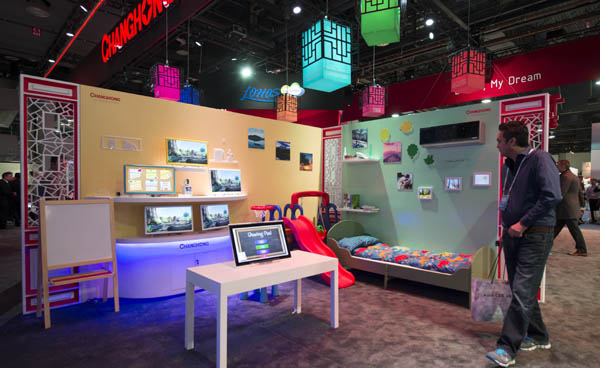China, US to tap trade and investment potential
By Chen Weihua (China Daily) Updated: 2014-12-13 08:04
 |
|
Intelligent home systems made by Sichuan Changhong Electric Co Ltd attract attention at the International Consumer Electronics Show in Las Vegas, in January. China was among the top three export markets for 42 US states in 2013. [Photo/Xinhua] |
Forum to connect private sector, government officials on both sides
Senior Chinese and United States officials will meet next week in Chicago for a high-level forum to address bilateral trade and investment issues and promote business opportunities.
The Chinese delegation to the 25th session of the China-US Joint Commission on Commerce and Trade from Dec 16 to 18 will be led by Vice-premier Wang Yang on the Chinese side. From the US side, the team will be led by Secretary of Commerce Penny Pritzker and US Trade Representative Michael Froman.
It will be the first time for the JCCT to include a full day of events to facilitate private-sector engagement with Chinese and US officials, according to the US Department of Commerce.
This year's meeting will also include a roundtable discussion on bilateral investment, a cooperative travel and tourism program and developing a shared vision of economic leadership.
Fast-growing trade and investment ties have long been regarded as an important anchor for a stable bilateral relationship.
Speaking to the President's Export Council on Thursday, US President Barack Obama said that China has great interest in the relationship with the US and recognizes the interdependence that has evolved between the two economies.
"The business investment treaty that they have shown an interest in negotiating could end up being a significant piece of business. We actually saw some movement during my last trip on issues surrounding technology," Obama told the council, comprised of private business leaders, lawmakers, governors and mayors and his cabinet members.
During Obama's trip to Beijing last month, the two governments reached a deal on climate change with commitment on reducing carbon emissions. They also agreed to the reciprocal issue of 10-year business and tourist visas and five-year student visas, to expand the scope of the Information Technology Agreement and speed up negotiations on a bilateral investment treaty.
In Beijing on Thursday, representatives from both sides began the 17th round of BIT talks.
"It was agreed that the two sides will make their best efforts to reach an agreement by the end of the year on core issues and major clauses of the treaty and launch negative list negotiations next year," Zhang Yesui, China's vice-foreign minister, told the annual conference of the China US Exchange Foundation in Hong Kong last week.
Sean Minder, the China program manager and research associate at the Washington-based Peterson Institute for International Economics, said a BIT would increase foreign direct investment between China and the US.
"The economic benefits from increased FDI would flow both ways and encourage needed structural reforms in both countries," Miner wrote in an article posted on the Peterson Institute website.
On Tuesday, Pritzker hailed the visa agreement, noting that 1.8 million Chinese traveled to the US last year, spent $21 billion and supported more than 100,000 American jobs.
- Cash crunch fans expectation on RRR cut
- US extends antidumping duties on China's thermal paper
- Modern food van with ancient look in Shanghai
- China home prices continue to cool in November
- Asia's top 3 billionaires all Chinese
- Old investment remedy the treatment for China's "new normal"
- China's solar sector opposes US anti-dumping ruling
- BMW to recall 846 cars in China
















